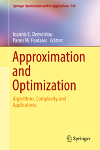- About MAA
- Membership
- MAA Publications
- Periodicals
- Blogs
- MAA Book Series
- MAA Press (an imprint of the AMS)
- MAA Notes
- MAA Reviews
- Mathematical Communication
- Information for Libraries
- Author Resources
- Advertise with MAA
- Meetings
- Competitions
- Programs
- Communities
- MAA Sections
- SIGMAA
- MAA Connect
- Students
- MAA Awards
- Awards Booklets
- Writing Awards
- Teaching Awards
- Service Awards
- Research Awards
- Lecture Awards
- Putnam Competition Individual and Team Winners
- D. E. Shaw Group AMC 8 Awards & Certificates
- Maryam Mirzakhani AMC 10 A Awards & Certificates
- Two Sigma AMC 10 B Awards & Certificates
- Jane Street AMC 12 A Awards & Certificates
- Akamai AMC 12 B Awards & Certificates
- High School Teachers
- News
You are here
Approximation and Optimization: Algorithms, Complexity and Applications

Publisher:
Springer
Publication Date:
2019
Number of Pages:
237
Format:
Hardcover
Series:
Springer Optimization and its Applications
Price:
109.99
ISBN:
978-3-030-12766-4
Category:
Collection
[Reviewed by , on ]
Maulik A. Dave
02/24/2020
This book is a collection of papers on optimization problems. The papers are invited papers that were presented at a conference on Approximations and Optimization in 2017. It includes survey papers, algorithm papers, theoretical papers, and application papers. The applications are in modern popular areas such as economics and machine learning.
The first survey paper on the No Free Lunch (NFL) theorem introduces a theorem on all optimization problems that suggests that all optimization algorithms perform equally well over an entire class of optimization problems. The paper gives NFL theorems for various types of optimization problems along with their literature references. Searches, evolutionary, and some machine learning algorithms are included. The second survey paper on evolutionary machine learning optimization is specific to multi-objective optimization and covers both supervised and unsupervised learning techniques.
There are four papers on real-life applications of optimization problems. A paper on portfolio optimization defines the problem, discusses various ways of estimating related parameters, and provides results of real data. On the engineering side there is a paper on smart composite materials. Mathematical models for plates of different materials with adhesive layers and associated finite element method formulation of static analysis are introduced. For dynamic analysis fuzzy controllers are shown.
Almost half of the book is for readers interested in the algorithmic side of optimization. A decomposition theorem is presented by a paper, which partitions data for a least squares problem. Dynamic programming is applied to the partitioned data to achieve quadratic time efficiency. Another paper proposes a fast data smoothing algorithm for densely packed data with a small number of errors. There is also a paper giving algorithms for adaptive regularization with smoothing constraints.
This book would be suitable as a textbook at any level, but it could be of interest to researchers currently working on optimization problems.
See the publisher's web page.
- Log in to post comments




